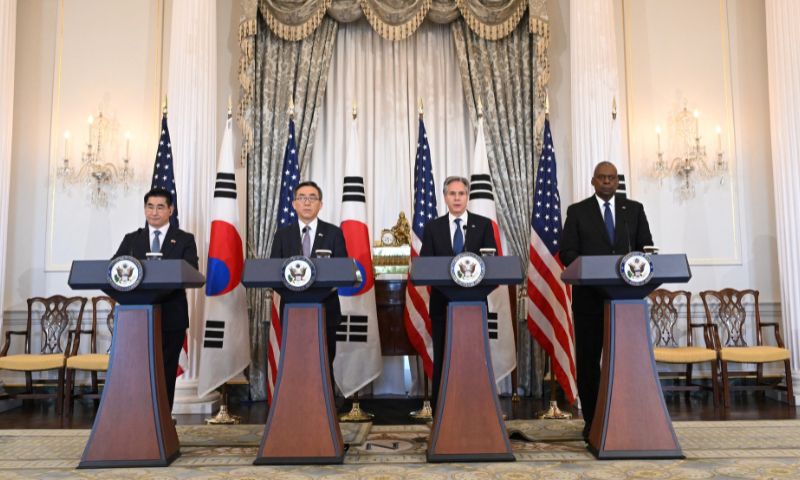WASHINGTON: The United States, Japan and South Korea on Thursday jointly urged North Korea to end its “provocative and destabilizing” actions after its most powerful intercontinental ballistic missiles (ICBM) launch, following a call by the three allies’ foreign ministers.
US Secretary of State Antony Blinken, along with his counterparts from South Korea and Japan, expressed their concerns over the launch, which they believe threatens regional and global peace.
In a joint statement, they said, “We strongly urge North Korea to immediately cease its series of provocative and destabilizing actions that threaten peace and security on the Korean Peninsula and beyond.”
The missile test, described by South Korea as a solid-propelled long-range ballistic missile, reportedly flew 1,000 kilometers (approximately 621 miles) after being launched on a lofted trajectory. It reached an altitude of 7,000 kilometers and was airborne for around 86 minutes, making it one of North Korea’s most significant tests to date.
“These provocative actions cannot be ignored,” Blinken stated. The missile launch is particularly alarming, occurring just days before the US presidential elections, and follows accusations that North Korea had dispatched troops to Russia to support the ongoing invasion of Ukraine.
North Korean leader Kim Jong Un described the missile launch as “an appropriate military action” that demonstrates the country’s commitment to strengthening its nuclear capabilities. Despite international condemnation and the clear violation of United Nations Security Council resolutions, Kim vowed that North Korea would not change its strategy of bolstering its nuclear forces.
China, North Korea’s traditional ally, expressed concern over the recent developments and called for a political resolution to the ongoing tensions.
Meanwhile, Ukrainian President Volodymyr Zelensky criticized the lack of action from the international community regarding North Korea’s troop deployment, expressing frustration at what he termed “zero” reactions from major players, including China.
The United States and South Korea held high-level talks on Thursday following North Korea test-fired one of its newest and most powerful missiles, demonstrating its threat to the US mainland days ahead of presidential elections.
The latest weapons test was the first since North Korea was accused of deploying troops to Russia to support the invasion of Ukraine, triggering alarm and warnings by Europe, Washington and Seoul.
Tokyo reported that this missile flew longer than any previously tested by North Korea, remaining airborne for 86 minutes, marking a new record for North Korean missile capabilities.
The timing of North Korea’s latest launch appears to be deliberate. Analysts suggest it may be intended to divert international attention from recent criticisms regarding North Korea’s alleged troop support for Russia.
Yang Moo-jin, president of the University of North Korean Studies in Seoul, said that Pyongyang’s missile launch is likely an attempt to “distract from international criticism of its troop deployment.”
The test adds urgency to the already-scheduled talks between US Secretary of State Antony Blinken and Defense Secretary Lloyd Austin, and their South Korean counterparts. South Korean President Yook Suk Yeol condemned the launch as a violation of UN Security Council resolutions and announced new independent sanctions against Pyongyang.
The United States, South Korea, and Japan plan to hold joint military exercises, with US strategic assets expected to participate. The White House and UN Secretary-General Antonio Guterres have denounced the missile launch as a clear violation of Security Council resolutions.
The Korean Central News Agency quoted North Korean leader Kim Jong Un as calling the launch a “necessary military action” to demonstrate North Korea’s “counteraction will,” vowing that the country “will never change its line of bolstering up its nuclear forces.”
While North Korea denies sending troops to Russia, recent comments from its vice foreign minister indicated that if such a deployment were to occur, it would be “in line with international law.” Western intelligence suggests, however, that Pyongyang’s recent actions may be part of a larger deal with Moscow, signed in June.























